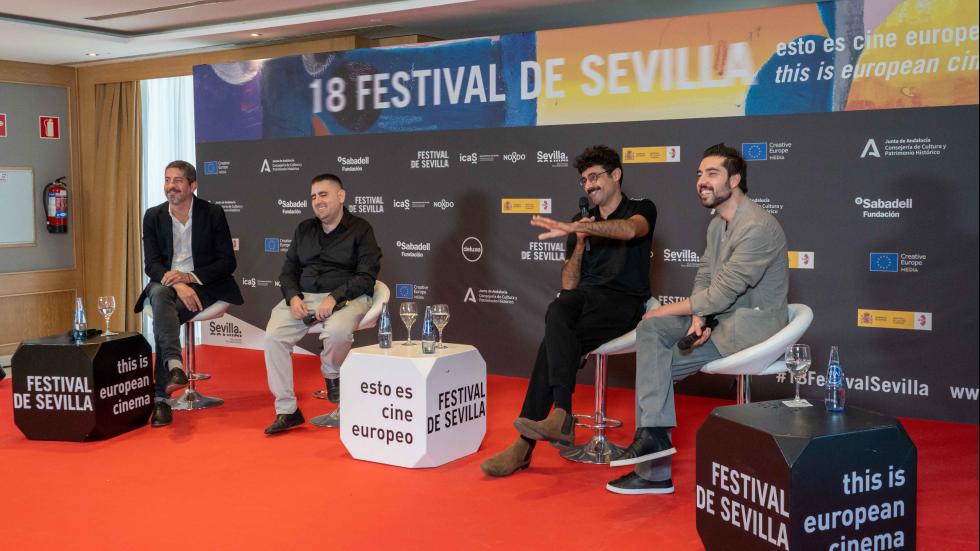Chema García Ibarra, director from Elche, with an award-winning career as a short filmmaker, presents at the Seville Festival a tragicomic thriller that approaches ufology starring non-professional actors
Seville, November 8 - On its fourth day, the 18th Seville Festival welcomed one of the most influential filmmakers of our time, Chema García Ibarra (Elche, 1980), who presented to the press his first feature film, Sacred Spirit, competing for the Giraldillo de Oro (Golden Giraldillo Award). The filmmaker from Elche, in his resounding leap to feature films, arrives in Seville backed with a Special Mention in Locarno Festival's awards following a celebrated career as an award-winning short filmmaker in competitions such as Berlin and Sundance with El ataque de los robots de Nebulosa-5, Protopartículas and Misterio.
García Ibarra brings a particular look at the everyday life of his native town of Elche, mixed with elements of tragicomic thriller, featuring non-professional actors, to narrate the search of a missing girl and the adventures of her uncle, the only one who knows about the imminent arrival of an extraterrestrial force. The director's proposal is, therefore, an approach to the universe of ufology and paranormal phenomena set in the context of an apparently normal community.
The director was accompanied by the actor Nacho Fernández, the little Llum Arqués and the producer Miguel Molina, who confessed that he entered the production without having read the script: "We already produced one of his previous shorts and we had been insisting for a long time that he should make the leap to feature film. We were very confident that the talent he showed in his short films was a guarantee of success".
The filmmaker talked about the germ of his film and the vindication of the periphery in his creative universe: "I have always been interested in shooting away from the cities where films are usually set: I am tired of seeing scenes from Malasaña. And I also like different accents, the local food, how they dress, the music they listen to... Getting away from common places," he emphasized. "At the same time, I'm very interested in science fiction, I was quite obsessed with that genre during my adolescence. And I like to make the films I want to see as a spectator. As a result of all this, Sacred Spirit was born."
"The planning is very well thought out, I don't like to film things I'm not going to use. Add to that the fact that we shoot on celluloid and every time you hit the record button, euros are rolling in," said García Ibarra with a smile. "That implies asking ourselves a lot of questions about the shot we want and it forces a very refined tone, going to the essence, something we have learned from a filmmaker that fascinates me, Robert Bresson," he explained.
Sacred Spirit abounds in almost delirious, absurd aspects, which in the end have a lot to do with reality. In this sense, the filmmaker pointed out that one of his favorite books is a classic book of anthropology, The Golden Bough, by James George Frazer. For García Ibarra, "the work gathers a lot of customs and rituals from all over the world, and compares them. There are some very beautiful ones that I kept for the film. I work a lot with this type of micro-ideas that I keep, which can come from a book or something I've heard on the street. I store all that and then put it into my scripts."
One of the most surprising aspects of the film, and of García Ibarra's cinema, is in achieving very naturalistic interpretations. The director explained to the media that Nacho Fernández, the main character, has not yet seen the film. "Before shooting, I offered him two possible scripts: a complete one and another one with the parts of his character. He chose to read only the part that had to do with the character, to have the same information, but he didn't know how the film ends. That is part of my work with the actors". He also explained the methodology of previous projects to the media. "In rehearsals I am also interested in the concept of what constitutes a mistake for an actor: if they mumble, if they forget something, if a reply comes in a little later.... Well, that's not a mistake. We look for a certain degree of effortlessness. In the work process we read the text once, and then we put it aside, we have to be clear about the idea and use our memory, incorporating expressions of each actor, accents, the pace of each one, the way of speaking...".







